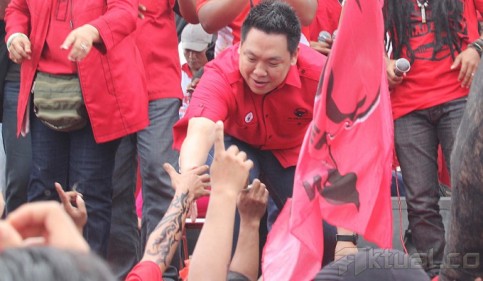
Charles Honoris
POLITIK CHARLES HONORIS
oleh: Eggy Sudjana Case
Do these articles really violate freedom of expression as protected by the Indonesian Constitution? Was the decision to annul the Criminal Code articles on insulting of the head of state correct? More importantly, are these provisions still relevant in a democratic Indonesia?
Due to their wording, how the articles are applied and interpreted is the key to understanding whether or not these articles violate the freedom of expression. Their elasticity allows them to be misused by those in power to suppress criticism of the head of State. Thus, the Constitutional Court decided correctly when it in annulled articles 134, 136 and 137 of the Criminal Code. After all, we already have articles 310-321 of the Criminal Code on defamation. The reputations of the head of state and every person in the country are protected by these articles.
Political satires such as Republik BBM and newspaper cartoons should be protected under freedom of speech. These are simply creative methods of criticizing policies and portraying events. The Eggi Sudjana case, however, was different. His statement to the media involved the making of blatant accusations against five individuals, which could harm their reputations.
It’s time to be truthful about the past A nation’s history is often dark and filled with controversy. In Indonesia, especially, the truth behind various past human rights abuses remains hidden behind the twisted world of politics.
Even after the reforms that began in 1998, the Indonesian government and people appear to be reluctant to uncover the nation’s dark past of human rights abuses. Indonesians, according to historian Taufik Abdullah, “seem to have a hobby of upholding historical burdens.”
It is no secret that in the past, Indonesia’s track record on human rights was far from excellent, if not downright ugly. During the Soeharto years, human rights abuses were widespread. Those opposing the regime were forced into submission by any means, including torture. The Indonesian military’s presence in conflict areas, such as Aceh and East Timor, was often marked by human rights abuses.
I remember reading years ago the testimony of an Acehnese woman who was tortured by the Army. She was forced to disclose the location of her husband, who was a suspected member of the Free Aceh Movement (GAM). She was raped and beaten and by the end of the week had the tips of her nipples cut off with scissors.
In 1991, elements in the Indonesian military are believed to have massacred more than 200 protesters in East Timor in an incident known as the Santa Cruz Massacre. All of this was done in our name.
There are also such unresolved incidents as the student shootings at Trisakti and the May 1998 riots. The government has never apologized to the victims for the State’s inability to protect its citizens from such brutal pogroms.
Pustaka Charles Honoris


